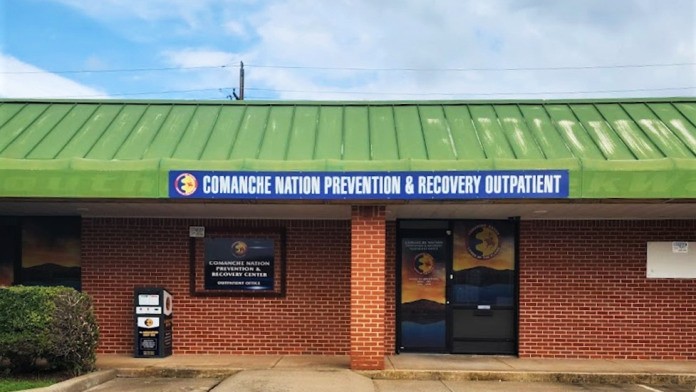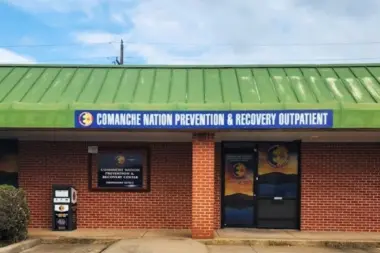I felt like they knew exactly how to make you feel comfortable
About Comanche Nation Recovery Center
The Comanche Nation Recovery Center is a comprehensive medical center that also provides substance abuse prevention and recovery services for people of Native American descent in Lawton, Oklahoma. It is managed by the Comanche Nation and provides primary outpatient support for people recovering from or experiencing active alcohol and substance addiction. This particular location is the New Pathways program that offers transitional residential support but they can connect you to their other programs too.
Diverse Programs for Addiction and Mental Health
Along with treating community members of Native American descent fighting addiction, the center also provides prevention programs for youth that not only cover substance abuse but mental health outreach as well. This includes suicide prevention, awareness and outreach.
Treatment Assistance in Southern Oklahoma
The Comanche Nation Recovery Center provides a host of services designed to help community members overcome addiction. This includes both residential and outpatient treatments and even relapse prevention classes to help others maintain sobriety. Note that gambling addiction can also be managed here.
Depending on the severity of a participant’s addiction, some people may qualify for referrals to drug and alcohol assessments. Likewise, medication assisted treatment (MAT) for opioid use can also be an option. For both assessments and active treatment, financial support is available.
Reintegration Support
Just as important as actively treating addiction is helping newly sober people reintegrate back into daily life. The Comanche Nation Recovery Center offers case management support to help tribal members return home after long-term substance abuse treatment or even after incarceration. This is offered in part by collaborative partnerships with local community organizations serving the greater southwest Oklahoma community.
Patient Care Advocacy When You Need It
The Comanche Nation’s healthcare services also include access to Comanche Health Representatives (CHR) and Emergency Medical Service Program (EMS) who act as advocates for individuals and families of Native American descent within surrounding counties including Comanche, Cotton, and Tillman. This also includes parts of Caddo, Jackson, Jefferson, and Stephens Counties.
Facility Overview
Latest Reviews
Rehab Score
Gallery


Other Forms of Payment
Financial aid can take many forms. Centers may have grants or scholarships available to clients who meet eligibility requirements. Programs that receive SAMHSA grants may have financial aid available for those who need treatment as well. Grants and scholarships can help you pai for treatment without having to repay.
Medicare is a federal program that provides health insurance for those 65 and older. It also serves people under 65 with chronic and disabling health challenges. To use Medicare for addiction treatment you need to find a program that accepts Medicare and is in network with your plan. Out of pocket costs and preauthorization requirements vary, so always check with your provider.
Private insurance refers to any kind of healthcare coverage that isn't from the state or federal government. This includes individual and family plans offered by an employer or purchased from the Insurance Marketplace. Every plan will have different requirements and out of pocket costs so be sure to get the full details before you start treatment.
Addiction Treatments
Levels of Care
Intensive Outpatient Programs (IOP) are for those who want or need a very structured treatment program but who also wish to live at home and continue with certain responsibilities (such as work or school). IOP substance abuse treatment programs vary in duration and intensity, and certain outpatient rehab centers will offer individualized treatment programs.
Completing a drug or alcohol rehab program shouldn't spell the end of substance abuse treatment. Aftercare involves making a sustainable plan for recovery, including ongoing support. This can include sober living arrangements like halfway houses, career counseling, and setting a patient up with community programs like Alcoholics Anonymous (AA) or Narcotics Anonymous (NA).
Residential treatment programs are those that offer housing and meals in addition to substance abuse treatment. Rehab facilities that offer residential treatment allow patients to focus solely on recovery, in an environment totally separate from their lives. Some rehab centers specialize in short-term residential treatment (a few days to a week or two), while others solely provide treatment on a long-term basis (several weeks to months). Some offer both, and tailor treatment to the patient's individual requirements.
Outpatient Programs (OP) are for those seeking mental rehab or drug rehab, but who also stay at home every night. The main difference between outpatient treatment (OP) and intensive outpatient treatment (IOP) lies in the amount of hours the patient spends at the facility. Most of the time an outpatient program is designed for someone who has completed an inpatient stay and is looking to continue their growth in recovery. Outpatient is not meant to be the starting point, it is commonly referred to as aftercare.
Treatments
The goal of treatment for alcoholism is abstinence. Those with poor social support, poor motivation, or psychiatric disorders tend to relapse within a few years of treatment. For these people, success is measured by longer periods of abstinence, reduced use of alcohol, better health, and improved social functioning. Recovery and Maintenance are usually based on 12 step programs and AA meetings.
To address the issues of addiction, each drug rehab in Oklahoma is tailored to meet the individual's needs. Treatment may occur in a residential or outpatient setting, and may last from a few days to several months.
A combined mental health and substance abuse rehab has the staff and resources available to handle individuals with both mental health and substance abuse issues. It can be challenging to determine where a specific symptom stems from (a mental health issue or an issue related to substance abuse), so mental health and substance abuse professionals are helpful in detangling symptoms and keeping treatment on track.
Opioid rehabs specialize in supporting those recovering from opioid addiction. They treat those suffering from addiction to illegal opioids like heroin, as well as prescription drugs like oxycodone. These centers typically combine both physical as well as mental and emotional support to help stop addiction. Physical support often includes medical detox and subsequent medical support (including medication), and mental support includes in-depth therapy to address the underlying causes of addiction.
Programs
Adult rehab programs include therapies tailored to each client's specific needs, goals, and recovery progress. They are tailored to the specific challenges adult clients may face, including family and work pressures and commitments. From inpatient and residential treatment to various levels of outpatient services, there are many options available. Some facilities also help adults work through co-occurring conditions, like anxiety, that can accompany addiction.
Young adulthood can be an exciting, yet difficult, time of transition. Individuals in their late teens to mid-20s face unique stressors related to school, jobs, families, and social circles, which can lead to a rise in substance use. Rehab centers with dedicated young adult programs will include activities and amenities that cater to this age group, with an emphasis on specialized counseling, peer socialization, and ongoing aftercare.
Clinical Services
Whether a marriage or other committed relationship, an intimate partnership is one of the most important aspects of a person's life. Drug and alcohol addiction affects both members of a couple in deep and meaningful ways, as does rehab and recovery. Couples therapy and other couples-focused treatment programs are significant parts of exploring triggers of addiction, as well as learning how to build healthy patterns to support ongoing sobriety.
Research clearly demonstrates that recovery is far more successful and sustainable when loved ones like family members participate in rehab and substance abuse treatment. Genetic factors may be at play when it comes to drug and alcohol addiction, as well as mental health issues. Family dynamics often play a critical role in addiction triggers, and if properly educated, family members can be a strong source of support when it comes to rehabilitation.
Group therapy is any therapeutic work that happens in a group (not one-on-one). There are a number of different group therapy modalities, including support groups, experiential therapy, psycho-education, and more. Group therapy involves treatment as well as processing interaction between group members.
In individual therapy, a patient meets one-on-one with a trained psychologist or counselor. Therapy is a pivotal part of effective substance abuse treatment, as it often covers root causes of addiction, including challenges faced by the patient in their social, family, and work/school life.
Amenities
-
Residential Setting
Staff
Bonnie Lemon
Director
Airick Klann
Assistant Director
Anna Silverhorn
Project Director Comanche Nation Indigenous Healing Project
Brittany Turner
Project Director Comanche Nation Native Spirit Project
Robert Allen
Project Coordinator Comanche Nation Native Spirit Project
Rhianna Nelson
Prevention Specialist
Martin Flores
Project Director IAMNDN
Harlequin Ototivo
Project Coordinator IAMNDN
Contact Information
8503 NW Madische Road
Lawton, OK 73501